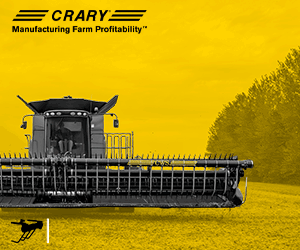Informed decisions
FROM THE CEO'S DESK

AS FARMERS, WE have access to technology that helps us increase the quality and yields of our crops and helps us more accurately plant, fertilize and harvest our fields. It is technology that is ever-evolving and adapting to meet the growing demand to produce more food on less land – by 2050, we will need to grow enough food to feed 9.6 billion people worldwide.
How will we do that safely and effectively if we do not have access to new technology? Currently, we have a science-based government regulatory system which ensures that the inputs we use and the crops we grow are safe. It is a system of checks and balances that evaluates risks to human health, animal health and the environment. It ensures the safety and security of our food supply.
Recently, we are seeing a threat that this science-based approval process is in danger of giving way to public opinion based regulations. Public opinion has always held sway with politicians – it is the role of elected officials to listen to what their constituents want. The new issue is, where is the general public getting the information that is forming their opinions on issues related to the agricultural industry?
We now live in a world where people get their information from 140 character tweets. Twitter is a great resource for information, and is a tool many farmers have embraced. But it can have a downside. An alarmist tweet by a celebrity about a particular farming practice or food product can reach millions of people in an instant – many of whom will re-tweet the message without stopping to question the validity or the science behind the claim. There is nothing to stop false information from being recirculated so many times that it becomes accepted as fact. If there is a call to action in the tweet asking you not to buy a product or to support a particular product that is deemed safer, greener, or more sustainable, there is a certain percentage of the population that will act without question. But questions need to be asked.
Mark Lynas, an advisor, author and public speaker on science, climate change and biotechnology, used to be an anti-GMO activist. He has publicly reversed his stance, after realizing the same science-based standard he was using against climate change skeptics should also be applied to his own anti-GM beliefs. He now acknowledges that extensive scientific, peer reviewed testing has proven GM foods are safe and that he had not done any academic research about plant science when he first began speaking out against the development of genetically modified crops. He now helps to refute the mis-information that gets distributed through traditional and social media. We are pleased that he has agreed to be a speaker at our 2014 March Classic.
What we need are more Mark Lynas’; more people who are willing to listen to the research and make science-based opinions and decisions. We need time to thoroughly research and study new issues when they arise, and not let assumptions or biased opinions form the basis of our laws and regulations. Our science-based regulatory approval and re-investigation process has made Canada one of the safest food producers in the world. That is something we should all tweet about. •








